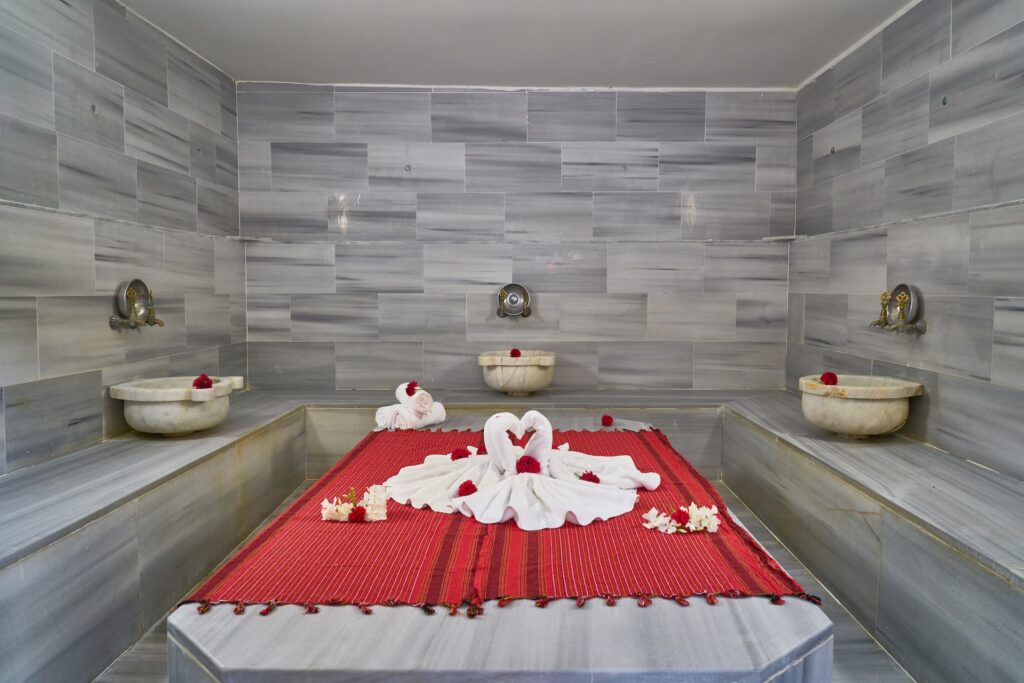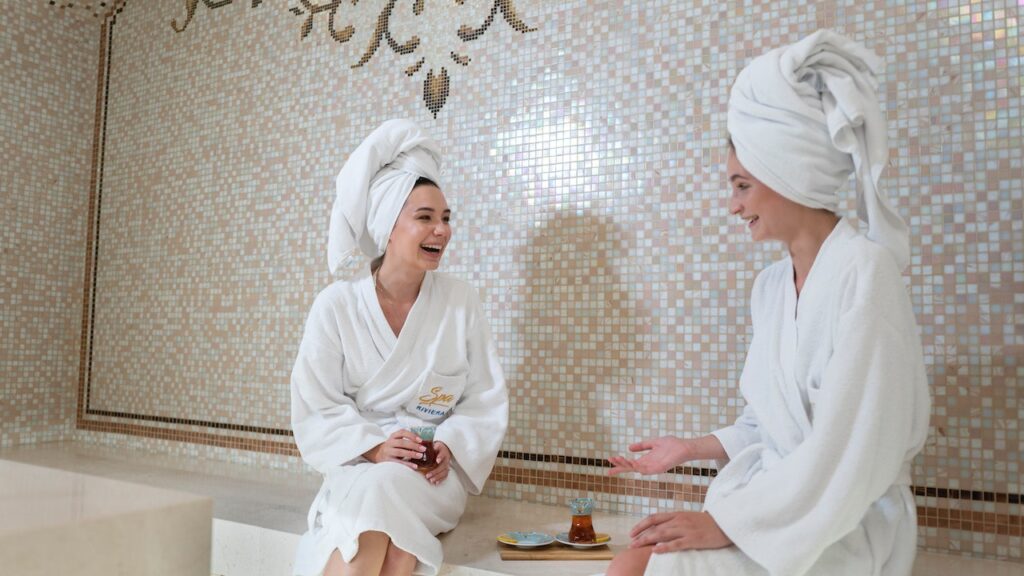Imagine a world of pure indulgence and relaxation, where time stands still, and the worries of everyday life melt away. Welcome to the world of Turkish hammams and spas, where ancient traditions meet modern luxury to create an experience like no other. From the historical significance of hammams to the evolution of contemporary spa culture, Turkey offers a diverse range of options to unwind and rejuvenate. In this article, we’ll take you on a journey through the fascinating world of hammams and spas in Turkey, where pampering oneself is an art.
The Tradition of Hammams in Turkey
Historical Significance
Hammams, also known as Turkish baths, hold a significant place in Turkish culture and history. Dating back to the Ottoman era, these public bathhouses were not merely places to cleanse the body; they were social hubs where people gathered, shared stories, and connected with one another. The architecture of hammams reflects a blend of Roman, Byzantine, and Islamic influences, making them living artifacts of Turkey’s past.
Hammam Rituals and Ceremonies
The traditional hammam experience is a ritual that involves a series of steps, each designed to cleanse and rejuvenate the body and soul. The journey typically begins with a warm room to relax the muscles, followed by a hot steam bath to open the pores. Then, a skilled masseuse exfoliates the skin with a kese (a coarse mitt) to remove dead skin cells and impurities. Finally, a cool room provides a refreshing end to the ritual, leaving one feeling revitalized and serene.
Modern Spa Culture in Turkey
Evolution of Turkish Spas
As the world evolved, so did the concept of relaxation and wellness. Turkish spas have adapted to modern sensibilities while preserving the essence of their heritage. Today, Turkey boasts an array of luxurious and sophisticated spas that cater to both locals and international visitors, offering a wide range of treatments and services to meet every individual’s needs.
Spa Treatments and Services
Turkish spas offer an extensive menu of treatments that combine ancient techniques with contemporary innovations. From indulgent massages using aromatic oils to invigorating body scrubs and facials, each treatment is designed to enhance overall well-being and provide a sense of tranquility. The use of natural and organic ingredients further enriches the spa experience, ensuring that every moment is blissful.

Popular Hammam and Spa Destinations in Turkey
Istanbul: Where Traditions Meet Modernity
As the cultural and historical heart of Turkey, Istanbul is home to some of the most iconic hammams and spas. Experience the opulence of the Ayasofya Hurrem Sultan Hammam, located in the heart of Sultanahmet, or indulge in the luxurious settings of the Ciragan Palace Kempinski Spa, overlooking the Bosphorus.
Pamukkale: A Spa Oasis in the Cotton Castle
Pamukkale, often referred to as the “Cotton Castle,” is a natural wonder that boasts thermal springs with healing properties. The Hierapolis-Pamukkale Spa is the perfect place to immerse yourself in the soothing waters and admire the stunning travertine terraces.
Bodrum: Coastal Luxury and Serenity
Bodrum’s serene coastline and azure waters create an ideal setting for spa retreats. Pamper yourself at the Six Senses Kaplankaya Spa or the Ersan Resort & Spa, where the sea views complement the soothing ambiance.
Cappadocia: Spa Amidst the Fairy Chimneys
Cappadocia’s otherworldly landscapes provide a unique backdrop for spa experiences. Unwind at the Museum Hotel Spa or the Argos in Cappadocia Spa, both offering panoramic views of the fairy chimneys and valleys.

Unique Features of Turkish Hammams and Spas
Architecture and Design
The architecture of Turkish hammams and spas is a harmonious blend of ancient traditions and modern aesthetics. Many spas are housed in historical buildings, adorned with intricate tilework and domed ceilings that transport visitors to another era. The use of natural light and serene interiors further enhances the sense of tranquility.
Use of Natural Ingredients
Turkish spas are renowned for using natural and locally-sourced ingredients in their treatments. Olive oil, honey, and various herbs are commonly used in massages, scrubs, and facials, providing a nourishing and sensory-rich experience.
Relaxation Techniques and Therapies
The art of relaxation is at the core of Turkish hammams and spas. Skilled therapists incorporate ancient techniques, such as the art of touch and rhythmic movements, to induce deep relaxation and promote holistic healing.
Benefits of Hammams and Spas
Physical Benefits
Hammams and spas offer numerous physical benefits, such as improved circulation, detoxification, and muscle relaxation. The steam and heat in hammams help to open the pores and release toxins, while massages alleviate muscle tension and improve flexibility.
Mental and Emotional Well-being
The calming ambiance and soothing treatments of hammams and spas have profound effects on mental and emotional well-being. Stress and anxiety melt away, leaving individuals with a sense of peace and rejuvenation.
Cultural Immersion and Experience
Visiting a traditional hammam is not only about indulging in spa treatments but also about experiencing a vital aspect of Turkish culture and heritage. The communal aspect of hammams fosters a sense of connection and community, adding depth to the overall experience.
Tips for Enjoying a Turkish Hammam or Spa Experience
Choosing the Right Spa
Research and choose a spa that aligns with your preferences and
needs. Whether you seek a luxury resort spa or a traditional hammam, Turkey offers a diverse range of options to cater to every taste.
Understanding Spa Etiquette
Before visiting a hammam or spa, familiarize yourself with the local customs and etiquette. Respectful behavior and following the instructions of spa staff contribute to a pleasant and enjoyable experience.
Personalized Treatments and Services
Communicate your preferences and any specific concerns to the spa therapists. Most spas offer personalized treatments tailored to individual needs, ensuring a bespoke experience.
The Impact of Turkish Hammams and Spas on Tourism
Wellness Tourism in Turkey
The rise of wellness tourism has positioned Turkey as a top destination for travelers seeking rejuvenation and relaxation. The country’s rich spa culture and diverse offerings have contributed significantly to its appeal as a wellness destination.
Attracting International Visitors
The allure of Turkish hammams and spas extends beyond the country’s borders, attracting visitors from around the globe. Wellness travelers seeking an authentic and immersive experience are drawn to Turkey’s unique spa offerings.
Conclusion
In a world where stress and fast-paced living have become the norm, Turkish hammams and spas offer a sanctuary for relaxation and rejuvenation. From the ancient traditions of hammams to the contemporary sophistication of modern spas, Turkey’s wellness culture is a reflection of its rich history and warm hospitality. So, indulge in the art of pampering, and let the healing touch of Turkish spa rituals envelop you in blissful tranquility.
FAQs
Are hammams and spas only for adults?
While many hammams and spas cater to adults, some establishments offer family-friendly treatments and experiences suitable for all ages.
Can I visit a hammam or spa if I have specific health conditions?
It is advisable to consult with a healthcare professional before visiting a hammam or spa, especially if you have specific health conditions or concerns.
Are reservations necessary for spa treatments?
Reservations are recommended, especially for popular spa destinations and during peak seasons, to ensure availability and a seamless experience.
How long does a typical hammam or spa session last?
The duration of a hammam or spa session can vary depending on the treatments chosen. Sessions can range from one hour to several hours.
Are Turkish hammams and spas hygienic?
Yes, Turkish hammams and spas adhere to strict hygiene and sanitation standards to ensure the well-being of their guests.


